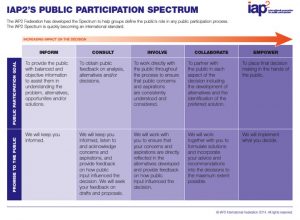We welcome a guest post from Larry Schooler, manager of the public engagement division for the city of Austin, Texas.
When is a referendum a good idea and when is it the wrong thing to do?
Citizen referenda bypass elected representatives and “the people” (or those who choose to vote and have the right to do so) decide.I am concerned that yes/no kind of referenda are not a good idea unless there is a strong lead-up for effective deliberation and the kind of question really is a yes/no choice.
I’m thinking about this based on actual or possible referenda not just for the June big event in the UK knows as “Brexit”, but also in Minneapolis, and my hometown of Austin.
- Did the United Kingdom’s Brexit vote resolve anything? What does such a narrow margin of victory for the Leave (EU) position really mean?
- What about the referendum in Austin, Texas, on transportation networking companies like Uber and Lyft? The measure was drafted by the companies and when it failed, two of the largest companies left the market entirely, though both sides have signaled the conversation isn’t over. What did that accomplish?
- And what happens if a referendum moves forward in Minneapolis to require police officers to carry liability insurance? It may not even make it onto the ballot if the City Council says it’s illegal under state law, which could prolong the fight even longer in an expensively litigated process.

It is clear that referendum measures drafted by citizens, reinforced by petition signatures, are here to stay. I think they serve as an important “check” on the power of elected officials. But a “referendum on referendums” is in order.
For some context, I develop and implement public engagement strategies for a living, and I am a big proponent of the Spectrum of Public Participation from the International Association for Public Participation. [Used by permission, © International Association for Public Participation ]

Click on it for the key details: on the far right, the “Empower” level, means, essentially, that governments may allow the public to make some decisions directly at the ballot. When a fundamental change to how a city, or state, or nation is governed comes up for discussion, or when the public is asked for more money to pay for government services, it makes general sense to me that voters should have some opportunity to review those proposed changes—taxation with representation, if you will.
Additionally, participatory budgeting constitutes one of many examples of such an “empowered” decision-making processes, and such a referendum also seems worthwhile—let citizens come up with ways to spend their own tax dollars, and then take a vote on which of the suggested projects are worth public investment. Greensboro, NC has just completed a participatory budgeting process.

But I see a critical distinction between a process giving a voter several choices on what to buy with their tax dollars and a measure that is reduced to the question, “Are you in…or out?” Hardly any decision, political or otherwise, is ever that simple—and especially one affecting millions like Brexit.
Had the European Union referendum been presented with, say, more options than “Leave” or “Remain,” I could see it as more legitimate. That is, what if the choice were to remain but with specified changes to the United Kingdom’s membership? Or to leave but retain specific continental alliances?
The notion of a citizens’ right to petition, enshrined in the U.S. Bill of Rights, remains very legitimate to me. After all, no matter how legitimately chosen a governing body might be, at least in democratic nations, citizens must retain some check on their elected representatives’ power—and not have to wait to exercise that until an election (often scheduled by those same representatives when they deem it necessary).

But I think Roger Scruton had it right on the BBC when he said, “The common good, rather than mass sentiment, should be the source of law, and the common good may be hard to discover and easily obscured by crowd emotions.” Furthermore, he argues convincingly the notion of “direct democracy” practiced by the ancient Greeks and even some towns and cities in New England is very difficult to implement in our much larger and more dispersed societies.
Now, that isn’t to say that the public has no idea of what the common good is, nor should the petition process be considered null and void simply because some petitions might lead to outcomes that elected officials do not like. It does suggest the limitations of an over-simplified pair of choices given to the public on a ballot. A yes/no choice is likely to leave many feeling defeated or excluded from whatever the outcome.
The use of a referendum in such high-profile ways, however, also suggests that governments must continue to examine and re-examine what it means to engage the public effectively—before a matter reaches the ballot.
Here are some questions to seek your thoughts on referenda:
- Are we open to options we haven’t considered that a large portion of the public supports?
- Can we have dialogue with our public and facilitate deliberation among citizens in search of a consensus on policy, rather than giving them a chance to weigh in at the 11th hour on a limited set of options?
- Can people participate in the conversation with their representatives without waiting around for hours to speak for minutes?
A referendum on how the public can and should participate has my vote. But our current referendum process needs to earn my vote.
An earlier version of this post appeared at Huffington Post.
I agree with your comment that big political decisions are rarely (if ever) as simple as “Yes/No”. In fact, I have shown mathematically that the referendum is the least efficient way there is to find out what people think about a major topic. Didn’t stop my government having a referendum on membership of the European Union though!
This is where alternative voting options, like ranked or scored voting, come in. You guys are far more progressive in this domain than we are here in the States! I imagine a lot of it has to do with our two-party, non-parliamentary system…
Larry – interested in your reaction for the argument to “go back” to earlier democracy.
Ran across the plug for a new book: Against Elections: The Case for Democracy by David Van Reybrouck
In a nutshell, per the blurb:
Fear-mongering populists, distrust in the establishment, personality contests instead of reasoned debate: these are the results of the latest elections.
In fact, as this book shows, the original purpose of elections was to exclude the people from power by appointing an elite to govern over them.
Yet for most of its 3000-year history, democracy did not involve elections at all: members of the public were appointed to positions in government through a combination of volunteering and lottery.
Read more at https://www.penguin.co.uk/books/1112592/against-elections/#bH2yQBwhM33QD67a.99
John, thanks for your comments; the blurb for book (which I haven’t yet read but hope to) makes some interesting points. I, for one, would like to see reforms to the way in which we conduct elections and place candidate elections along a spectrum of sorts, or within a portfolio, of civic engagement. It would take another whole blog post to discuss the flaws in our current election and campaign finance system, but I certainly would say that voting for candidates, in the U.S., in its current configuration, is not the most meaningful civic engagement activity there is.
Thank you for these thoughtful comments about referenda. I too agree that they can vastly oversimplify complex policy disputes, especially when yes/no is the answer. If those were the only options I had in a referendum on referenda, I would have to vote no, but your post shows that its more complex than that – that the best choice would be yes, sometimes and for some kinds of issues, and no, sometimes, for other kinds of issues. As someone who has done a lot of work with deliberation, I do think, as you suggest, that a referendum vote AFTER there has has been time for deliberation/dialogue and education on the issues, is the preferred approach.
Great post, Larry. I think there are ways to reform this growing tendency to subvert elected representatives and address issues via referendums. A project I worked on here in Colorado last year – Building a Better Colorado – held a series of meetings with grasstops leaders across the state, coupled with a robust online engagement platform for those who couldn’t make it to the meetings. We found a fairly high, bipartisan degree of support for increasing the geographical distribution requirements of petition signatures, as well as setting higher thresholds for certain types of citizen-referred measures to make it onto the ballot. I’d be interested in finding out if certain local governments have put in place similar restrictions…